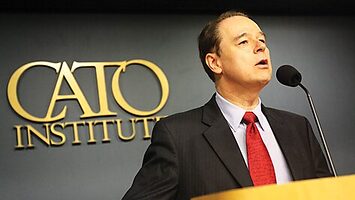Remembering David Boaz
Remembrances of how David Boaz helped foster the libertarian student movement.

David Boaz was many things: a scholar, leader, mentor, passionate advocate of change, strategic thinker, historian of the movement, and dear friend to many. In other words, David was the kind of person that inspired many while he was alive and should continue to inspire many more, long after his death.
When I was 21, I reached out to David to invite him to speak to a small gathering of libertarian students. We expected to have a small group, perhaps only thirty people. To my surprise, David said yes. He was willing to take a chance on a group of kids he had never met before. His willingness to take a chance on us was a shot in the arm to do more ourselves. When he gave the opening address at the first Students For Liberty Conference, it was for 100 students from 42 schools and three countries. As proud as I was of exceeding the expectations set for David, I was more proud of the encouragement he gave me and the other founders of Students For Liberty to keep going.
For the next year, I got to work at Cato and from time to time assisted David on projects. He provided guidance and support in my early career that I will always cherish. Whenever he asked for assistance with research, retooling his material to reach a younger audience, or anything else, he took the feedback he received seriously. He would provide substantive comments on anything given to him, even from a young twenty-something who was far less experienced or knowledgeable than he was. When he discovered I had moved into an apartment a block away from his home, he invited my roommate and I out to dinner to welcome us to the area.
Just as David took feedback on his own work seriously, he also provided feedback with equal seriousness—on issues both large and small. David’s criticism was never intended to bring anyone down, but rather to help us be better. He would repeatedly emphasize the need for students to learn how to market in-person events to avoid empty seats and maximize our impact. Two examples of David’s commitment to impact and accuracy stand out in my mind:
- When we were organizing our first SFL Regional Conferences, David was scheduled to speak at one in Boston. We were still figuring out how to build the organization, and registrations weren’t going as well as we had hoped. A week before the event, I shared the numbers with David, and he told me it wasn’t worth it for him to travel for such a small group. This wasn’t discouraging, though. It was motivation for us to retool our approach and create a stronger conference plan the following year. And so, while David was willing to use his time to motivate a small group of young libertarians, he was also teaching us the importance of thinking about the impact of our work.
- On another occasion, SFL posted a quotation from a famous person on social media. I forget the details, but David reached out to me to say he didn’t think the quotation was accurate. When I investigated it, I discovered David was correct, the quote was not authentic. Not only did we take the social media post down, but we implemented stronger protocols to ensure that our future content aspired to greater standards of accuracy.
Few people knew as much about the libertarian movement and the history of contemporary politics as David. He could spot the misspelling of a relatively unknown senator’s name and could recall the names of many organizations and leaders in the libertarian movement that others had long since forgotten. While every book is a labor, there’s no question that, for David, Libertarianism: A Primer was a labor of love in which he could allow his many ideas to flow onto paper.
David stood on the shoulders of giants and became one himself. It’s on all of us to not only carry on his memory, but his work. And it is an honor to do so.